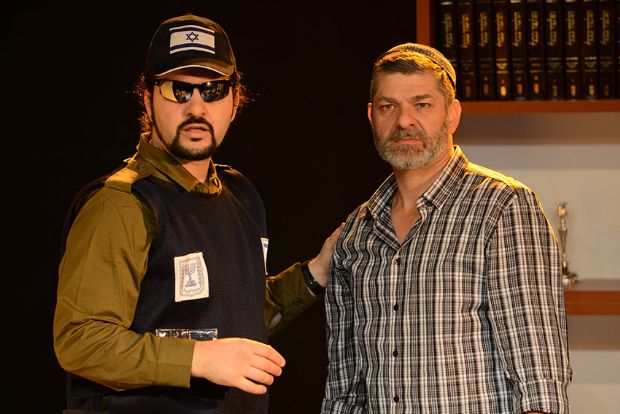Danny Steg in a Unique Play about Gush Katif: "A Small Personal Redemption"
The evacuation of Gush Katif around ten years ago impacted an entire country and changed the lives of approximately eight and a half thousand evacuated Jews, yet it was met with almost complete artistic silence. This is now changing with the debut of the play "Bulldozer." "I recommend the play especially to those who don't feel connected to what happened," says actor Danny Steg. "I think it can provide them with new insights."

Recently, the Aspaklaria Theater launched "Bulldozer," the first play of its kind that addresses the evacuation from Gush Katif and attempts to touch upon the political decision-making process that led to it. The play also features actor Danny Steg, who portrays a character of one of the evacuees, also a sort of community leader.
Regarding the reasons that led him to take the role, unlike any he has done before, Steg says it was an opportunity for him to express his true voice on the painful issue of the expulsion that occurred 10 years ago. "At the time, I did not protest the expulsion, even though inside I was in pain and disagreed with it even slightly," he says. "The reason I chose to participate in the play is the knowledge that I can finally voice my true opinion. You could say that participating in the play is a kind of small personal redemption, my way of protesting the decisions that led to such a great rift in all our hearts."
 Danny Steg in 'Bulldozer' (Credit: Aspaklaria Theater)
Danny Steg in 'Bulldozer' (Credit: Aspaklaria Theater)The play seeks to shed light on the influence of figures such as media and strategy advisors in Israeli society and how they dealt with their roles between the Prime Minister's decision and the methods chosen to execute the exit from Gush Katif. Although it is a fictional storyline, the reality it reflects is not necessarily far from the events of the 2005 expulsion.
Did you encounter any 'different type' of conflicts in your role?
"Not more than in any other role I've played. Every role has its challenges, but I strive to do the best I can."
Against the backdrop of pro and con opinions voiced at the time about the process, Steg recommends anyone close to the subject to come and see the play. But more so, the play is recommended for those who seem 'emotionally detached' from all that transpired. "If someone were to tell me to come and see a play about the head of the 'B'Tselem' organization, I wouldn't go. I simply oppose them. I'm sure there are sides of the Israeli public who think this way about the disengagement process: that it's good and a shame we aren't also disengaging from Acre, Haifa, Tel Aviv, and everything that bothers Arabs from executing their plans on us. But I would indeed recommend people who think this way to come and see the play, if only for the fact that it has aspects I think will bring them new insights. Hidden aspects that followed the feelings of those who were truly present there – on both sides: both the settlers expelled from their homes and the decision-makers."
 Steg as the settler evacuated from his home, in the play 'Bulldozer'
Steg as the settler evacuated from his home, in the play 'Bulldozer'The question arises as to why only now, more than ten years after the disengagement, which was followed by a total artistic disregard of the subject, someone takes up the mantle again, bringing it to light. On this question, Hagai Lober, CEO of Aspaklaria Theater, who participated in writing and directing the play, responded: "Artists create from their experiences, from their pains, joys, and perspectives – creating reality. Thank God, in recent years, perhaps as a result of the expulsion, there are artists who have experienced different things, and they are expressing this." Lober further adds that "Bulldozer" is "the first but not the only one" of artists who experience things in this country and bring them to expression, in hopes that the country does not turn its back on the mixed feelings left in the hearts of the evacuees, from then until today.

